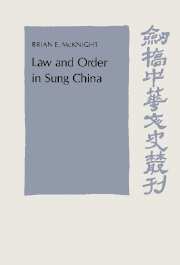Book contents
- Frontmatter
- Contents
- List of figures, maps, and tables
- Preface
- List of abbreviations
- 1 Introduction
- 2 The historical context
- 3 Crimes and criminals
- 4 Informal and semiformal agencies of law enforcement
- 5 Formal civil agencies of law enforcement
- 6 The role of the military in law enforcement
- 7 Supervision of law enforcement – the role of the intendants
- 8 Personnel selection
- 9 Urban crime and urban security
- 10 The Sung penal system
- 11 Jails and jailers in the Sung
- 12 Penal registration
- 13 The death penalty
- 14 Modifications of penalties
- 15 Conclusion
- Glossary
- Bibliography
- Index
8 - Personnel selection
Published online by Cambridge University Press: 23 December 2009
- Frontmatter
- Contents
- List of figures, maps, and tables
- Preface
- List of abbreviations
- 1 Introduction
- 2 The historical context
- 3 Crimes and criminals
- 4 Informal and semiformal agencies of law enforcement
- 5 Formal civil agencies of law enforcement
- 6 The role of the military in law enforcement
- 7 Supervision of law enforcement – the role of the intendants
- 8 Personnel selection
- 9 Urban crime and urban security
- 10 The Sung penal system
- 11 Jails and jailers in the Sung
- 12 Penal registration
- 13 The death penalty
- 14 Modifications of penalties
- 15 Conclusion
- Glossary
- Bibliography
- Index
Summary
Introduction – general personnel patterns
To deal with disorders, the authorities must get enough adequately armed and trained personnel to the site in time, but such men will be useful only if they are properly led. Proper leadership implies experienced leaders with sufficient training in practical skills, as well as appropriate aims and motivations. The worst possible situation would be to have field-level leaders with practical expertise who held goals hostile to the general aims of the state. The tension between service to state and service to self, family, or some other limited group was nowhere in sharper focus than on this low level of the bureaucracy. Many men on this level could never be held to high standards of behavior by the lure of high office. Their chances of advancement were slight, especially if they entered the civil service through one of the less preferred methods. Therefore, if they were to be kept from abusing their positions to enrich themselves and their families, they had to be controlled by superiors and adequately remunerated. But what was desirable might not be feasible. Given the limited fiscal base of the traditional Chinese state and other competing demands on its resources, its ability to remunerate its functionaries was also limited. Therefore selecting men who, by their characters, would be inclined to behave properly was all the more important. To select a few such men would have been no problem. With an empire the size of the Sung, in which low-level bureaucrats numbered in the tens of thousands, it was a formidable task.
- Type
- Chapter
- Information
- Law and Order in Sung China , pp. 251 - 282Publisher: Cambridge University PressPrint publication year: 1992



